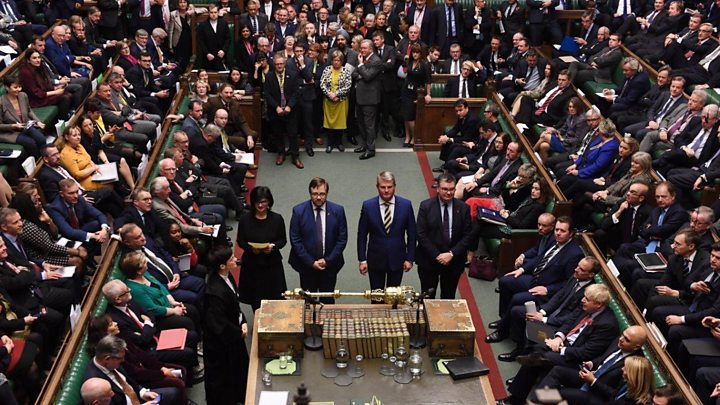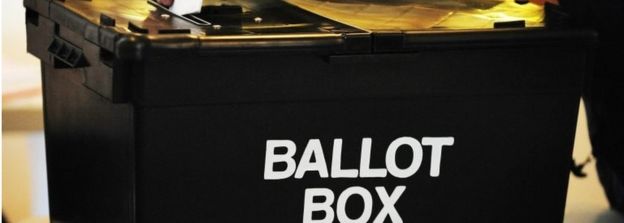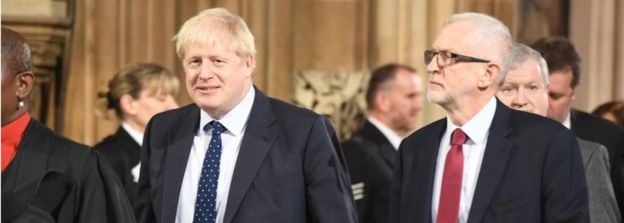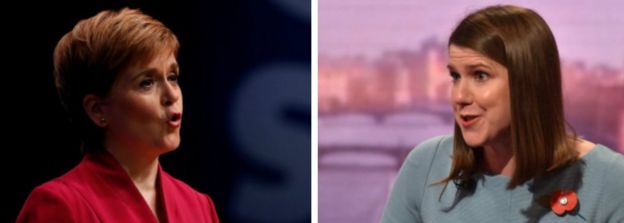“Leaders in pre-election clash over NHS, Brexit and economy”, BBC News
London, 30 October 2019
Boris Johnson and Jeremy Corbyn have clashed over the NHS, Brexit and leadership at the final Prime Minister’s Questions before the general election.
The Labour leader said voters had a “once in a generation” chance to save the NHS, which was in “greater danger” than at any time in its history.
He said voters had the chance to back “real change” and an end to austerity.
But the PM warned of “economic catastrophe” and “political disaster” if Labour got into power.
Political parties are readying themselves for a general election campaign after MPs voted for a 12 December poll.
- LIVE: Latest updates as parties prepare for 12 December poll
- Did my MP vote for a 12 December election?
- Poll tracker: How popular are Westminster parties?
- Former Home Secretary Amber Rudd standing down
The legislation approved by MPs on Tuesday will later begin its passage through the House of Lords, where it is not expected to be opposed.
In their final encounter in Parliament before the election, the two leaders exchanged barbs over their political values and disputed their parties respective records on the NHS.
Leadership, not protest
The Labour leader accused the PM of running down the health service, saying cuts to funding had contributed to rising waiting times for cancer treatment and operations.
He said a Labour government would reverse the privatisation of the NHS, saying his goal was to “make people better, not make the wealthy few richer”.
“The choice at this election cannot be clearer,” he said. “People have the choice to vote for real change to end years of Conservative and Lib Dem cuts and tax handouts for the richest.”
Mr Johnson said he agreed voters faced a “stark choice” between a government spending “unrivalled” sums on the NHS and a Labour government that would “wreck the economy”.

Dismissing the Labour leader as an “Islingtonian protester”, he said Mr Corbyn’s “flip-flopping” over Brexit would lead to “years of dither and delay” rather than a “bright future” under the Tories.
He claimed 2020 would be a “wonderful year” under a Tory government but a Corbyn government would lead to another referendum on Scottish independence and years of “toxic, tedious, torpor”.
The election comes after the EU extended the UK’s exit deadline to 31 January 2020 – although Brexit can happen earlier if a deal is agreed by MPs.

What happens next?
 Image copyrightPA MEDIA
Image copyrightPA MEDIA- The Early Parliamentary General Election Bill – which prompts the election – will be debated in the House of Lords on Wednesday
- If peers make any amendments to the bill, it will head back to the Commons for MPs to approve or reject the changes
- Once passed, the bill will receive Royal Assent – when the Queen formally agrees to the bill becoming law
- On Monday 4 November, MPs are due to elect a new Speaker to replace John Bercow
- Just after midnight on Wednesday 6 November, Parliament will be shut down or “dissolved” – meaning every seat in the House of Commons becomes vacant
- Five weeks later, the country will go to the polls for the first December election since 1923


The legislation approved by MPs now must be rubberstamped by the House of Lords.
It would be pretty strange if unelected peers up the corridor from the green benches decided to say no or throw spanners in the works of a decision made by the House of Commons last night.
Unless something very strange happens, we are now on for an election.
Both sides are very, very nervous about what might unfold. And both sides are right to be nervous.
The two main party leaders, in a strange kind of mirror of each other, are happy campaigners, but divisive characters.
Both of them will try to set the agenda, but they can’t know where this will all take us.
They can’t know if it will be their issues they’re able to talk about at length, but that’s the glory of elections – it’s up to voters to set the terms.
They decide the things they care about, they are interested in and they will put politicians on the spot about.

Opening skirmishes
 Image copyrightEPA
Image copyrightEPALabour’s Shadow chancellor John McDonnell, said the election wouldn’t just be about Brexit – telling BBC Breakfast: “It will be about what has happened over the last nine years of austerity and our public services.”
“We want to give people hope again about the future,” he said.
Health Secretary Matt Hancock said he was “certainly not yearning for general election”, but he believed it was “the only way to move the country forward”.
He said the Conservatives would be offering a “centrist agenda” to voters – and his party would be running a more “optimistic” campaign than their widely-criticised 2017 effort, which led to Theresa May losing her majority.
- A really simple guide to the UK general election
- How to register to vote, and other election questions
 Image copyrightREUTERS
Image copyrightREUTERSLiberal Democrat leader Jo Swinson said the poll was “our best chance to elect a government to stop Brexit”.
For the Scottish National Party, Scotland’s First Minister Nicola Sturgeon said an election was an opportunity for the country to hold another independence referendum.
“A win for the SNP will be an unequivocal and irresistible demand for Scotland’s right to choose our own future,” she said.
But the Scottish Conservatives claimed voting for their party would keep Scotland in the UK.
Brexit Party leader Nigel Farage welcomed the election, tweeting the deadlock had been “broken” and “Brexit now has a chance to succeed”.

Electoral pacts and coalitions
The smaller parties are already talking about striking deals with each other, which could see candidates standing aside in areas where their Remain-supporting rivals have a better chance of winning.
Deputy Lib Dem leader Ed Davey said the party was in discussions with Plaid Cymru and the Green Party “to see if we can work with them”.
Green Party co-leader Jonathan Bartley told BBC Breakfast it was “no secret” that the Greens were “talking to the Lib Dems and Plaid” but “nothing has been finalised”.
He said a “temporary electoral arrangement to stand aside for one another” would help elect “a big block of MPs that aren’t from the two main parties”.
“That idea of getting a big block of MPs in Parliament who want a people’s vote, want to remain in the EU because they think it’s best for the UK to do that, has widespread appeal.”
The party leaders are also facing questions about whether they would form a coalition, if the election resulted in another hung Parliament.
Asked if she would form a coalition government with Labour or the Conservatives, Jo Swinson said: “I can’t be clearer – neither Boris Johnson nor Jeremy Corbyn is fit to be prime minister.”
Labour’s John McDonnell told BBC Breakfast: “There will be no deals, no coalition. We will go in as a majority government. If we don’t win an overall majority, we will have a minority government.”